- Home
- Peter S. Beagle
The Magician of Karakosk, and Other Stories Page 18
The Magician of Karakosk, and Other Stories Read online
Page 18
Soukyan hunched his shoulders. “I don’t know. I suppose I will start at the cells, and if he is not there, then I will ask for his family, anyone who might have known him. After that….”
When he did not finish, she prodded him further. “After that? Find him or not, when is it over for you? I have no desire to winter in Kulpai.”
“I never asked you to come with me,” he said harshly. “I never asked that.” He said nothing further for a little; then, quietly, “A day, Lal. One single day, no more. If there is anyone in Kulpai for me to speak to, to say what I must say, I will know by then. If not—so be it, then not. This or that, one day.”
Lal nodded. She inclined her head slightly backward, indicating Riaan, who seemed to have heard none of their conversation. Soukyan gave a helpless shake of his own head, and looked away.
That night neither of them slept well. Soukyan found no comfortable way to arrange his big body on the damp ground; he heaved and struggled after slumber, never achieving more than a twitchy, short-lived doze. Lal, for her part, was visited by such dreams as had not found her in many years’ hungry searching. I thought surely you had forgotten where I lived, but they were all over her like murderous children, taking her so by surprise that none of the old shifts and sidesteps she knew to slip them, even in her sleep, were of any avail. She woke violently, running from a man long dead, who laughed sweetly as he followed. Soukyan roused instantly at her small cry, and came, out of old understanding, to hold her. He said only, “Who was it?”
“Shavak,” she whispered. “Shavak. I didn’t even kill him, and he is always the worst one. What are those lights?”
“What lights?” He turned his head and saw them as she had, bobbing and dancing far away, moving slowly closer; and as she had answered Riaan, he said, “Night gleaners again, poor souls. Nothing more.”
She sat up straight, pushing him away. “What gleaners? In this country? Where is the boy?”
They had the answer a moment later: Riaan’s voice, sounding more distant than it really was because of its anxious softness. Lal could not make out the words he was chanting, but Soukyan was on his feet with the first one. “Gods, he’s doing it, he’s summoning!” The lights were moving faster now.
Soukyan was already gone, taking long, lunging bounds, even in the darkness. Lal followed, calling, “He doesn’t know the spell, he can’t know it. I never spoke the words when he was by.” She was running as frantically as in her dream, as though she had never wakened.
Soukyan answered in hoarse gasps, not turning his head. “The magician did…. We didn’t hear… all the noise… but the boy heard—heard and remembered….”
“But not the same spell! The moon is wrong—and the Gardener—”
“I made all that up… so you’d behave…. Many spells to call a ghost….” He did look back then, his face gaunt and drawn and truly old now. “Hurry, Lal!”
Riaan’s voice was closer, more confident, repeating the same few words over and over. Lal could distinguish his form in the darkness now, because the lights were joining, flowing eagerly into one another to become one scarred, splotchy brilliance, as though the moon were shining up through the silt and roots and decay of the marsh. A figure was taking form, growing out of the light, around the light, and the boy’s voice leaped up in exultation, itself turning into light. Lal tripped over something she never saw, and fell flat, but Soukyan kept going, shouting back to her, “Move, Lal, move!” She heard Riaan’s victory chant suddenly splinter into a cry of horror, and she was back on her feet and moving.
There was only one light now. The shape was all but complete; only the face was yet indistinct, but Riaan already knew who it was. So did Lal, by its heavy-shouldered swagger and the fine boots. It walked toward Riaan, reaching out for him with its powerful arms, smiling with its shining face.
“Cajli,” Lal whispered at the same time that Riaan wailed the name. The light had faded notably, the creature being fully materialized now, but the face was beyond mistaking. No longer dull red, but a pulpy mushroom-white, its grin stretched too wide in the greasy black beard as it spoke. “Cajli’s Riaan,” it said, the jovial human menace in its tone far more dreadful than any sepulchral hollowness could have been. “Well met, well met, Cajli’s Riaan.”
Riaan made a tiny sound. Soukyan, still a good fifty yards away, shouted, “Cajli, skay’vas, Cajli!” He gestured with both hands as he ran, shouting that word and another. The ghost laughed at him. Even at a distance, the sound froze Lal as still as the boy: for a moment she could feel neither her skin, nor her thoughts, nor the feet on which she was trying to run. But she was not Riaan, and she had met ghosts before, and she was free of the chuckling cold and laboring doggedly on.
“Cajli’s Riaan,” the ghost said. “In your world or mine you belong to me, and nothing will ever change that. Not while you live, not after you die. Here to me, Cajli’s Riaan.”
The boy could not move, not even when Soukyan reached him and put his own arm tightly around his shoulders. “Skay’vas, Cajli! Hear me, dead man—skay’vas, tuja!” He brandished the great old bow like a wizard’s wand.
The ghost of Cajli halted, focusing its barren stare on Soukyan. It said, “Grandfather, do not come between us, for peril of your soul. All that was mine before is mine now—stop your useless, dribbling mouth and totter no nearer.” Soukyan could see the dainty wound in its chest where Lal’s swordcane had gone home.
Then she was there: a very old woman who had run too long on old legs, stumbling between Riaan and the white figure to gasp defiantly, “Back from him! Back! I have no word of power to banish you to where you belong, but I sent you there once and I swear I will again!” The swordcane was out and glinting, and if the legs were shaky, the black hand was not. “Ghost or demon or walking heap of putrid meat, back from him or you die a second time!” Soukyan moved up beside her, arrow at the string.
The ghost’s abrupt bay of laughter was chilling cousin to the sad crying of the korevu, and surrounded them in the same way. “Nay, stand clear of me, Grandmother. What you could do to me, you have done. Touch me now with that sacking-needle of yours and shrivel where you stand. Come within my reach and learn how cold it is where I live now.” It reached as though to ruffle Riaan’s hair, but Soukyan pushed the unmoving boy away. The dreadful mirth redoubled. “Ah, have no fear, Grandfather—why would I harm my faithful servant? Did he not most slyly summon me home to this upper world, missing his lord as he should, pining for his dear servitude? Aye, freedom’s wasted on his breed, and he knows it if you don’t.” It put out its thick, pale hands to Riaan once again. “To me, boy,” it said. “Quickly, before I grow impatient. You know how I am.”
Soukyan loosed his arrow. It passed through Cajli’s body as the bottle had through the magician’s taproom specter; but this time the arrow blazed up in a sickly yellow-green fire, which sprang back along its path straight to Soukyan’s hands. He opened his mouth and fell, curling on his side almost at Riaan’s feet.
Lal had started her strike as soon as the arrow took fire, and had no chance to turn the swordcane’s point aside. She felt its contact with the ghost as an instant of agony so cold that her flesh barely had time to recognize it as pain before she was down, face hard against mucky grass, body flopping like a landed fish. Unable to rise, or even to raise her head, she yet managed to use the momentum of the fall to twist onto her back, where she lay gaping helplessly at smeared, distorted stars and a moon like a rotten fruit. The mushroom-face was grinning down at her, saying, “I did warn you, Grandmother. Lie there, so, lie there and ponder the evil day that you crossed my path. I have business with my servant.”
Out of the side of her eye, she could see that Riaan had finally shaken free of his paralysis and was edging away, sliding one foot after the other only by force of will. The ghost followed, still unhurried; but the grimly benign chuckle had turned threatening. “Enough of this. We have far and further to go, and I’ll not be kept waiting by such as yo
u. You were born to serve me for eternity, Cajli’s Riaan, and you will serve me better in that other world than ever you did in this, or have eternity to regret it. Take my hand.” Riaan scrambled aside once more, and the ghost’s voice lowered to a snarling whisper. “Take my hand, boy!”
In the watery moonlight Riaan’s face looked as white as that other face, and seemed on the edge of flying completely apart; it had gone almost as far beyond his controlling as Lal’s body had beyond her own. For all that, when his answer came, it held a trembling pride unassailably high. “I was not calling you. I would die and be a hundred times more rotten than you before I would ever say your name again. I was calling for my father. I call him now.”
Lal heard him shout the fierce, bone-grinding word at the same time that she began dazedly to regain herself. She rolled over, clawed air to rise to her knees, and saw Riaan fronting the ghost of Cajli, fearless as only a person dancing on the furthest edge of terror can be fearless. Soukyan was standing—Lal breathed a formal phrase of gratitude in her oldest language—but when Cajli lunged at the boy again, Soukyan stumbled forward, and immediately fell over with the effort. Riaan dodged away, crying the spell louder a second time, as Lal lurched to aid Soukyan.
Nothing happened. The stars and moon went on slinking through a sky as dank as the ground underfoot, and the ghost’s laughter rose to a howl. “Why, there’s your answer, boy, there’s your father indeed. Son of nothing, child of no one, there’s not even a ghost that knows your name. Ash, ember, vile little cinder, you’ve no one in any world to belong to, save only me. Welcome, then, welcome twice over, Cajli’s Riaan.” Lal saw the name slash across Riaan’s shoulders, and fully expected blood to follow.
Later, two oceans from that place, she sometimes told it to herself, chanting it over like one of the tales she had trained little Choushi-wai to remember always, word for word. “Oh, but he never gave in, that Riaan, even then; never surrendered to what must have been a loneliness more fearful than I ever knew. No, he sang back at it, sang back clear as spring rain, ‘I don’t believe you! Alive or dead, I don’t believe you!’ And he called to his father yet once again, called with stolen words he did not understand to someone he did not know, someone so hopelessly far away in the endless dark. And yes, yes, yes, yes, someone came.”
No lights this time, no playful brightnesses swarming together to puddle into a deathly shining. There was only a rather small, nondescript figure taking shape before them so slowly that it seemed to be trudging a black desert far wider than the sands Soukyan had crossed to Lal’s door. Nor was there any sound, save for another yell of laughter suddenly cracking in Cajli’s throat, and the sound of Riaan not breathing. Soukyan fumbled blindly for Lal’s hand, already seeking his.
She never got as close a look at its face as she would have liked, but the body was as slender and deceptively sinewy as Riaan’s, and the wary, determined carriage just the same, though the boy’s lightness was long gone from that slouching form. Tired to death in life, it was nowhere near the end of its weariness; it had merely come one more journey to answer one more command. It said simply, in a flat country voice, “Well, here I am.”
The ghost of Cajli hissed like an angry shukri, but said nothing. Riaan gave a curious little sigh that Lal remembered all her days. He whispered, “You. You, please. Is it you?”
It did not speak again for a very long time, or perhaps a little while. Lal never knew. Its eyes were as uninhabited as the eyes of that other ghost, and its presence far less charged with the mockery of life that animated Cajli. But it seemed to her then that something trembled down below the emptiness, something came near to flickering into a human light. So softly that Lal’s heartbeat almost drowned the words, the ghost whispered, “Riaan?”
Riaan wept.
“I named you,” the ghost said. It leaned a little toward him, its hanging arms coming forward, the palms open. It asked, “Is that crying? Why do you cry? Here I am.” But Riaan dropped down on the ground and sobbed, not loudly, but as though he would never stop. Lal held on hard to Soukyan’s hand.
And so they might well have stayed until dawn, but for the ghost of Cajli. It stalked to within inches of the newcomer, who looked back briefly without expression, neither cringing away nor straightening its bowed shoulders. Cajli said, “I remember you. A field hand, you were, a tiller, never saw you without a sack of shit on your back. Well, well, fancy, and here we are.”
But the other’s strange attention was bent all on Riaan. It yearned toward him as he wept with a kind of terrible clumsiness, never quite attempting to touch him, but staring with eyes much too wondering and sad for its dead face. It said, “Eliath. My name is Eliath.”
Riaan managed to stop crying. He wiped his still-tender nose with the back of his wrist, winced, and snuffled, “Then I am Eliath’s Riaan.” The sound of the two words together brought a raw growl from Cajli, and at that Riaan smiled for the first time, and began to sing them over again and again. “Eliath’s Riaan, Eliath’s Riaan. I am Eliath’s Riaan.” And that too might have gone on till morning and long past, but for Cajli’s ghost.
“No,” it said. “Oh, no. Garbage has no father, a sack of shit leaves no heirs, a churl has no family but his mother’s master.” He had come too close; a bloodless hand closed on Riaan’s forearm, and Riaan screamed. Cajli’s ghost said, “Now.”
Soukyan and Lal never agreed on what happened next. To Lal it seemed that the weary little phantom that called itself Eliath instantly seized the hand of Cajli’s ghost, breaking its grip on Riaan in a motion as swift and burning as a shooting star. So much she was certain about: beyond that image, she retained only a stubborn memory of the two ghost hands, milkily transparent, blurring and melting hugely together in a sudden blizzard of white light. Somewhere very far away the churfas were screaming horribly.
Soukyan remembered the light also, but what he had seen moving against it were figures ripped from the night itself: inhuman silhouettes, all but shapeless, all but joined, swaying back and forth, dancers ringed by white fire. Both of them were making a wordless roaring sound, such as distant waterfalls make, or trees in a storm. There was no distinguishing Eliath’s ghost from Cajli’s, nor any way of knowing which would prevail, or what prevailing meant. The savage milkiness was rising, at once brightening unbearably and pulling apart, and the struggling figures themselves were beginning to come undone with it, raddling and unraveling like worn silk. He could not see Riaan at all, but he heard the boy cry out again, not in pain this time but in desperate fear, and not for himself.
“It was all wrong,” he said to Lal that one time. “They should never have been here, those two, I told you that, and they should not have been fighting. The more they fought, the more wrong it became, until the tension was too much for—for someone, for something. You saw none of that, truly?”
“Only the hands,” she answered. “The hands, no more.”
But what she did see at the last, and what Soukyan never mentioned at all, was a third hand. Small and dim against the light, it yet preserved its outline, not dissolving into the others, but on the contrary appearing to seek out and grip one of the hands fiercely, beginning to tug it toward the edge of the circle. Only for a moment Lal glimpsed this; then the whiteness ate up the sky, and she heard—or forever after thought she had heard—a sound like the banging of the windblown door of a great empty house.
Until she heard the boy calling, “Lal! Lal, Soukyan, here is my father!” she did not realize that her eyes were tightly closed. She opened them very slowly to find that the night had returned to its usual business of being dark and still—though the moon was low, and there was a hint of false dawn back over the levee road—and that Riaan was standing before her with the ghost of a bondman glimmering shyly at his shoulder. Of Cajli’s ghost there was no trace, no least echo, not even in the boy’s eyes. Riaan said again, “Here is Eliath, my father.”
Lal bowed awkwardly, saying, “You have a fine brave son, Master Eliath.�
�� The ghost inclined its head in return, but never stopped gazing at Riaan. Soukyan pushed abruptly past her, in his turn ignoring the ghost completely. “Let me see your hand,” he demanded. “Why are you holding it like that? Show me.”
Riaan had been keeping his right hand rigidly at his side, hidden slightly by his leg. Reluctantly, he put it forward now, and Lal caught her breath to see the four parallel marks on his palm, the exact color of the moonlight, and the single fat sear crossing the back, where a thumb would have clenched. Soukyan peered at the hand closely, swore in a whisper, and said, “Bloody thing’s frozen—there and there and there. What have you done to it?”
“It doesn’t hurt, not really,” Riaan said quickly. “See, it’s fine, I can use it,” and he made the hand open and close, though his eyes closed for an instant as he did so. He said, “I had to get him away, I had to make Cajli let go. Otherwise—I don’t know, I had to, otherwise—”
“Otherwise he would have been gone,” Soukyan said. “Everything in this world tries to force a ghost back where it belongs—most cannot even keep a foothold here until dawn. Cajli might have lasted that long, but no longer.”
“But he could have taken me with him,” the boy challenged. Soukyan nodded. “And you and Lal could do nothing—it was my father who saved me.” He burst out laughing with such rare, utterly unused joy that even the ghost of Eliath smiled. “And I saved him, only think of that. I, Eliath’s Riaan, I saved my father from going where Cajli has gone.” He broke into a shuffling, stamping jig of victory, spinning like a leaf in an eddy, wheeling suddenly to take Eliath’s hands and draw him into the dance.

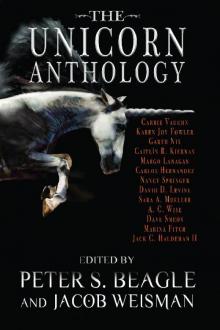 The Unicorn Anthology.indb
The Unicorn Anthology.indb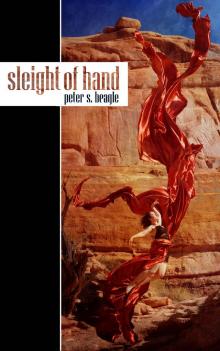 Sleight of Hand
Sleight of Hand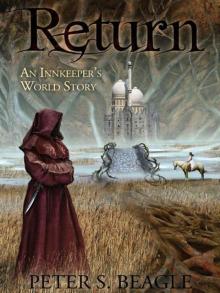 Return
Return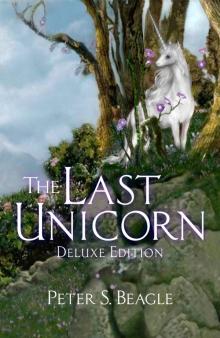 The Last Unicorn
The Last Unicorn Two Hearts
Two Hearts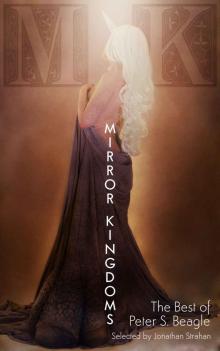 Mirror Kingdoms: The Best of Peter S. Beagle
Mirror Kingdoms: The Best of Peter S. Beagle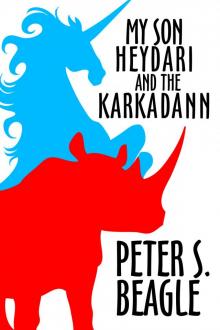 My Son Heydari and the Karkadann
My Son Heydari and the Karkadann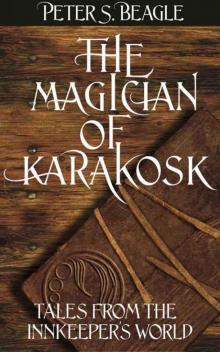 The Magician of Karakosk, and Other Stories
The Magician of Karakosk, and Other Stories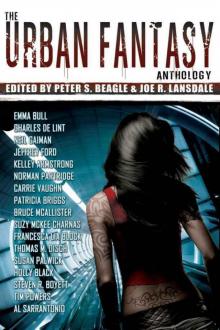 The Urban Fantasy Anthology
The Urban Fantasy Anthology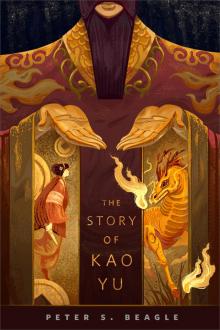 The Story of Kao Yu
The Story of Kao Yu The Karkadann Triangle
The Karkadann Triangle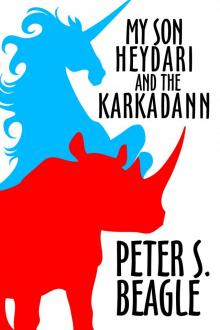 My Son and the Karkadann
My Son and the Karkadann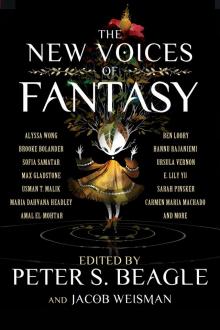 The New Voices of Fantasy
The New Voices of Fantasy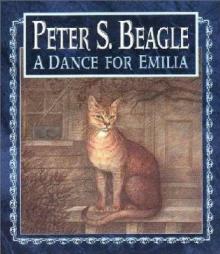 A Dance for Emilia
A Dance for Emilia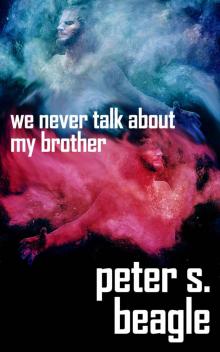 We Never Talk About My Brother
We Never Talk About My Brother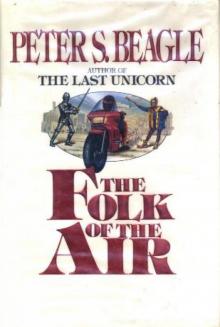 The Folk Of The Air
The Folk Of The Air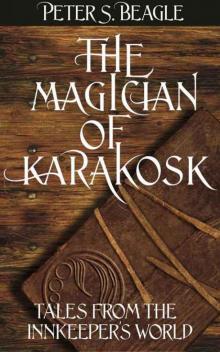 The Magician of Karakosk: Tales from the Innkeeper's World
The Magician of Karakosk: Tales from the Innkeeper's World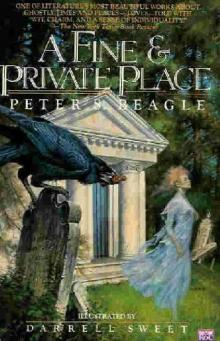 A Fine and Private Place
A Fine and Private Place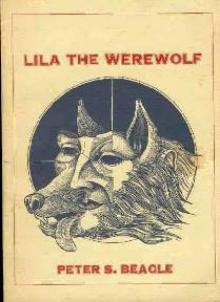 Lila The Werewolf
Lila The Werewolf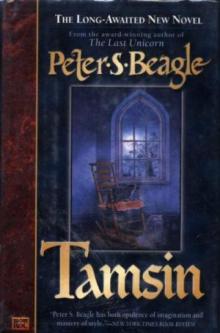 Tamsin
Tamsin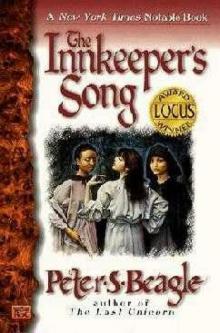 Innkeeper's Song
Innkeeper's Song